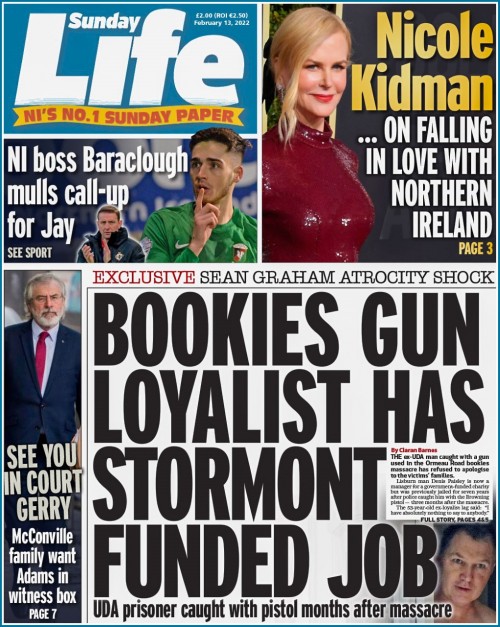The press watchdog has rapped a newspaper for wrongly reporting that a convicted gunman had refused to apologise to the victims of a massacre.
The Independent Press Standards Organisation has upheld a complaint against Sunday Life after it claimed Denis Paisley refused to say sorry to the families of the victims of a 1992 attack at a Belfast bookmakers.
Five people were murdered in the massacre and seven others were injured when two masked Ulster Defence Association gunmen opened fire in Sean Graham’s bookmakers.
Mr Paisley complained to IPSO after the Belfast-based paper covered a recent Police Ombudsman report which considered the investigations by police into a number of attacks, including the one on the betting shop.

The story focused on Mr Paisley, who Sunday Life believed featured heavily in the report, under a cipher, detailing his previous conviction for possessing a weapon used in the incident.
The paper reported that he had “refused to answer when our reporter asked if he would apologise to the families of the Sean Graham victims” but Mr Paisley claimed the reporter had not actually asked him whether he wished to do so.
Complaining under Clause 1 (Accuracy), Clause 2 (Privacy), Clause 3 (Harassment) and Clause 10 (Clandestine devices and subterfuge) of the Editors’ Code of Practice, Mr Paisley told IPSO he had never been asked to apologise for the atrocity prior to the approach from the journalist, because his conviction for possession of the weapon was nothing to do with the incident.
He provided an account of the exchange with the journalist and said the conversation ended when he made clear he did not wish to comment, either directly or through a solicitor, and then closed the door.
Denying any breach of Code, Sunday Life said the journalist had recorded the exchange at the doorstep – which had lasted for one-and-a-half minutes – for accuracy purposes, and provided a copy of the recording to IPSO which it said demonstrated the journalist was polite and gave Mr Paisley an opportunity to respond to his questions.
The newspaper said the journalist had given him ample opportunity to apologise for his association with the incident, or to sympathise with the families of the victims, but instead he had repeated that he did not wish to say anything.
IPSO found the recording of the exchange confirmed that the journalist had asked whether Mr Paisley had anything to say to the families of the victims, to which he had said he had no comment.
However the journalist did not expressly ask whether he wished to apologise to the families and it was therefore inaccurate to report that Mr Paisley had refused to apologise.
The distinction between declining to provide a comment and refusing to apologise was significant given that it might be construed as indicating Mr Paisley’s attitude toward the families of the victims and the incident more generally, IPSO ruled.
It concluded that misreporting the exchange, particularly when a recording was available, amounted to a failure to take care not to publish inaccurate information. No other breaches of Code were found.
The complaint was partially upheld under Clause 1, and the full adjudication can be read here.





 Follow HTFP on Twitter
Follow HTFP on Twitter